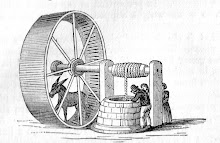Meanwhile Achilles of the nimble feet continued his relentless chase of Hector. As a hound who has started a fawn from its mountain lair pursues it through the coombs and glades, and even when it takes cover in a thicket, runs on, picks up the scent and finds his quarry, the swift Achilles was not to be thrown off the scent by any trick of Hector’s… And yet he could never catch him up, just as Hector could not shake Achilles off. It was like a chase in a nightmare, when no-one, pursuer or pursued, can move a limb.
(Iliad, Book XII)
Eventually, of course, Achilles does face – and slay – Hector outside the gates of his own city, with his mother and father looking on. He strips Hector of his golden armour, ties him to the back of his chariot, and defiles his corpse. The Trojans look on and weep; the Greeks take turns to stab the body with their weapons, jeering now that their enemy is “easier to handle”.
But here’s the thing: Achilles is only able to vanquish the man because Hector decides that enough is enough, a real man can’t run forever, and he should turn and bravely face his foe. The point is, Achilles can’t catch the guy. Hector has to stop.
(Well—actually—Hector is tricked into it by the goddess Athena who is disguised as Deiphobus, Hector’s brother, and she is supporting the Greek cause because… well, look, there’s a whole back story to do with love and jealousy and revenge. Go read Robert Graves.)
So -- I have been wondering about this alleged swiftness of Achilles. It’s a bit late for Hector, but maybe it’s time to revisit the reputation of the great Greek hero. What do we know, after all? He is quick to take offence—but slow to action. He can’t dodge arrows (which puts him in a category way below Green Arrow); he has one of his biggest fights with an angry watercourse (you think he could have avoided that one); and then, when Homer gets to the climax of his epic, he has to use a deus ex machina to get around his champion’s deficiencies. Reading between the lines, Achilles needs a lot of help for the son of a goddess.
And then there’s the tortoise.
Homer doesn’t mention this episode, but according to the paradox attributed to the philosopher Zeno, ‘fleet-footed’ Achilles is unable to even catch a casual tortoise.
Surely this can’t be the case? Sure, the tortoise came from behind to beat the hare, but we’re not talking about Egyptian fables anymore. This isn’t donkeys and frogs and scorpions; this is big bloody men, familial vengeance, golden tripods, funeral games, a shield made by an ugly immortal with a limp. A tortoise? Really?
The paradox runs like this: if the tortoise starts galloping away from Achilles, by the time that Achilles catches up to where the tortoise had started the tortoise has moved further on, which means that Achilles has to then get to that point. But, again, by the time Achilles reaches the second point, the tortoise has toddled on another few plods. Achilles can never catch up to the tortoise because to reach it he always has to first get to the place it started from, by which time the tortoise has hightailed it, is looking back over his shoulder at the frustrated warrior, and is presumably relieved that he is wearing armour.
It’s a lovely paradox.
And if we take Zeno seriously, there are several significant consequences.
The first, and most immediately important consequence in an Olympic year (note the continuation of the Greek theme?), is that we need to re-train our athletes so as to maximise their chances in relay events. Our coaches should be telling them to stand still while waiting for the baton, or it will never get passed from one runner to the next.
Second, if you get the jump on a Yarra Trams ticket inspector, you’re safe. This is good to know.
Third, there is a possible application for a new type of split engine which could be used for interstellar travel. Generally, if one tries to visualise Zeno’s paradox of Achilles and the tortoise, common sense tells one that Achilles must be covering shorter and shorter distances between ‘points’. Common sense, though, is assuming in this case that Achilles is actually the swifter party, and that the tortoise is travelling at a steady pace. But what if this is not the case? What if, instead, we conceive that while the following party is indeed the swifter, it is the following party that is travelling at a steady pace? In this case, to uphold the paradox, the forward member of the pair must continuously accelerate, getting exponentially faster and faster and further ahead.
So my contribution to science fiction is this: a dual engine system in which one rocket is sent out in pursuit of another, travelling at a steady rate, while the forward rocket is pushed out to the stars. All we need now is the Zeno drive: the field binding and enclosing the rockets into their special relationship, that force suspending common sense for the perpetual expansion of the human sphere.
Oh, hang on…
*
There’s been fire somewhere near Melbourne this week, and through the smoke haze the moon has been glowering yellowly over the city like a distempered eyeball. I’ve been thinking about fire and flames now that the season is changing to Autumn and the plane leaves have started to flare up and fall, and I’m waiting, I suppose, for the first fever, which has been doing the rounds. Not long now until I pack up my stuff and head off for Europe; I wonder if distances really are so hard to bridge, and what the moon will look like from that, different angle, and whether… many things.

